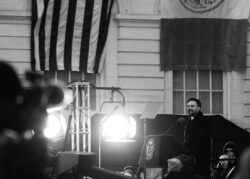The list of the host cities of the G-20 Leaders Summits for this year has a bit of a jarring finish: D.C., London, and … Pittsburgh? New York City, or Tokyo, or Paris would fit in better with that list of metropolises. President Obama did, in fact, ask New York City to host the event, but it declined, letting my hometown step up this Thursday and Friday. I’m thrilled that it did, because Pittsburgh deserves the attention.
The meeting of twenty heads of state from the world’s largest economies coupled with the protests that the G-20 Summit will inevitably elicit means intense media coverage across the globe. Pittsburgh is a city that sometimes still has “Pennsylvania” (and even, in international circles, “United States”) following it as an identifier in news stories—suffice it to say, not the kind of place that has double-decker tour buses running through it. Before the events this week, the scores of journalists descending on the city could attend “Why Pittsburgh?” tours, pointing to area universities, medical centers, museums, and ethnic neighborhoods.
Obama reportedly picked Pittsburgh because it has the largest gold Leadership in Energy and Environmental Design (LEED) certified convention center in the world, adding a touch of green to the summit, and because the city has weathered the recent economic disasters comparatively well. Local legend says that a spectacular breakfast experience at Pamela’s, a beloved diner, heavily influenced the President’s choice, along with his affection for the Steelers. Attributing the decision to host the gathering of twenty world leaders to a stack of pancakes is a thoroughly indigenous trait: Pittsburghers are intensely proud of local specialties, whether delicacies or linguistic tics, and will rave to anyone who will listen. In the past week, major publications––like Forbes and the Wall Street Journal––have featured native Pittsburgher journalists explaining why they’re so proud of their city. You won’t see the same kind of piece when a major international event takes place in say, D.C.
Think of Pittsburgh as the Rodney Dangerfield of cities: so much to offer, so little respect. Hence our outspokenness, extolling our native city’s value.
But this isn’t so much a chance for Pittsburghers to express their sense of self-worth—grand as it is—as it is a chance to project the city’s unique and shining image to the rest of the world. President Obama will surely call attention to how people in the town think first of hospitals and colleges, not steel. Instead of the massive hedge funds ensconced elsewhere in New England, Pittsburgh has PNC Bank, which a January 2009 New York Times article described as “resolutely unadventurous,” a favorable trait considering recent economic history. Instead of D.C.’s embassies or NYC’s consulates, Pittsburgh relishes its holdovers from ethnic neighborhoods established during the wave of Eastern European immigration in the first part of the 20th century: the aptly-named Polish Hill, or the Croatian Fraternal Union, or the giant costumed pierogi race during the seventh-inning stretch at Pirates games. The arts scene is truly of its own making—upstart independent presses, underground potluck dinners/poetry readings in sculpture studios, a “Festival of Firsts” dedicated to performances that mix as many genres as possible––all taking up residence in anything from abandoned mattress factories to the gorgeous theaters left over from the age of robber baron sponsorship.
How much this vibrant, determined culture can be expressed on the world stage remains to be seen. The summit’s central events take place in a tightly-secured section of downtown, in the triangle of land formed by the meeting of three rivers. These streets usually only close for throngs of black-and-gold clad revelers after a Super Bowl or Stanley Cup, but they’ll now be cordoned off so the summit can continue in its security bubble. For the few events that venture outside this central triangle, though, the world can glimpse the city’s real treasures. A working dinner for the heads of state will be hosted by Phipps Conservatory, a Victorian greenhouse built in 1893, which has been transformed into the most energy efficient conservatory in the world. And Michelle Obama will take the leaders’ significant others on a tour of the prized Andy Warhol Museum.
It’s impossible to know what kinds of unexpected turns this major event will take—including how the protesters will deal with the bridges and hills scattered around the city, and how media outlets will portray all of it to the rest of the world. I’m confident that whatever happens, Pittsburgh will show that its resilience and creative spirit merit a spot on G-20 host cities list, right beside the more widely known cities of the world.
Hitting the G-20 spot in Pittsburgh
September 24, 2009
Read More
Subscribe
Login
0 Comments
Oldest




